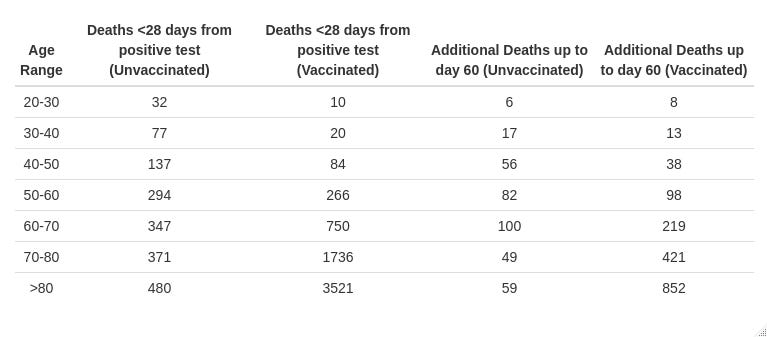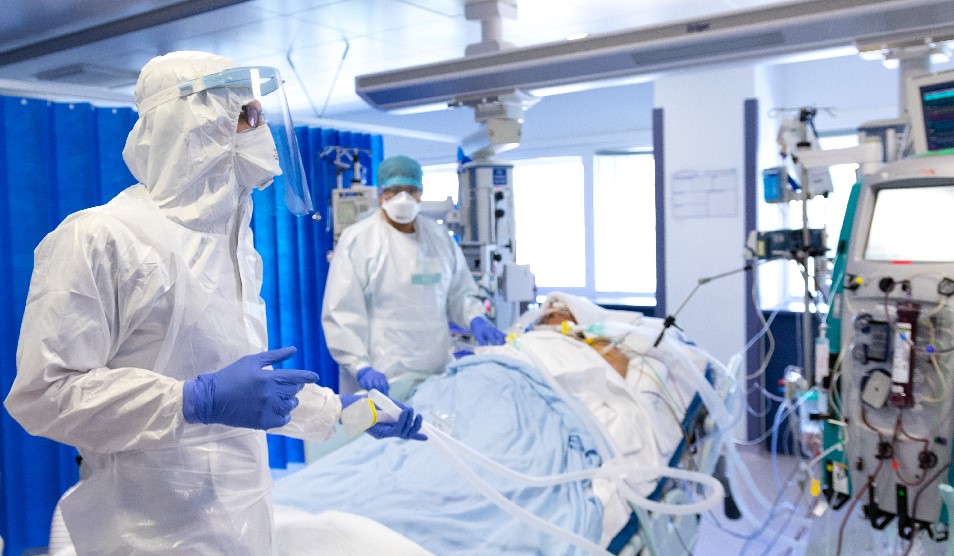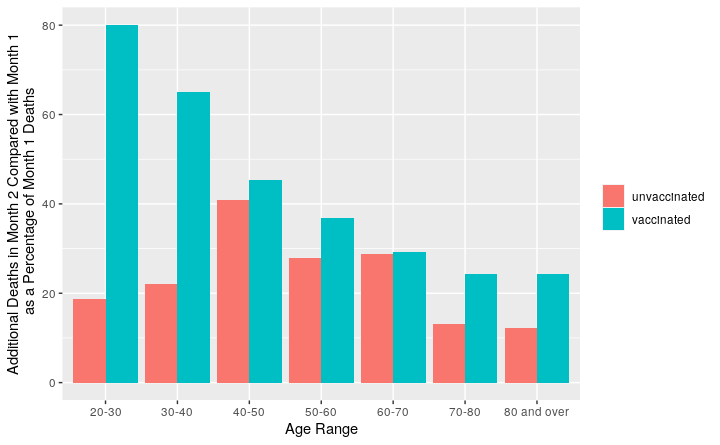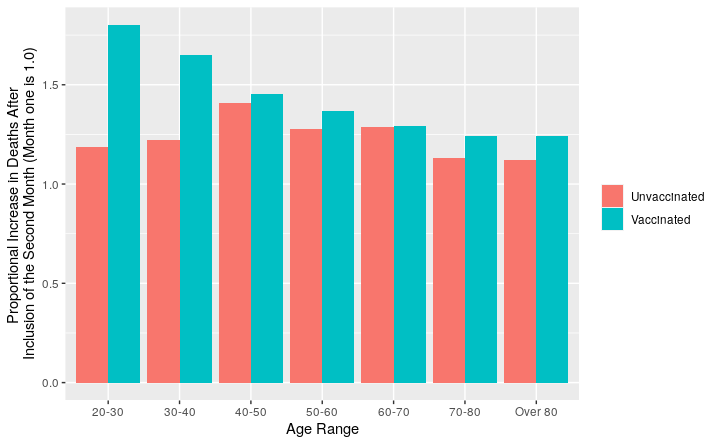There follows a guest post by ‘Amanuensis’, an ex-academic and senior Government researcher/scientist. It was first published on his Substack page.
The latest UKHSA Covid cases, hospitalisations and deaths data shows a continuation of an interesting trend – while the majority of deaths with Covid occur in the 28 days following their positive test, there appears to be a relatively larger number of vaccinated dying after this point, compared with the unvaccinated.
This effect can be seen in the following table 1, which shows data from the UKHSA vaccine surveillance reports for weeks 36 to 48:

For example, for those over 80 (the final row of the table), there were 480 deaths with Covid in unvaccinated individuals in the first 28 days after their positive test, but an additional 59 in the days that followed, up to day 60 – that’s an increase of approximately 12%. However, for vaccinated individuals aged over 80 there were 3,521 deaths with Covid in the first 28 days and an additional 852 deaths from day 28 to day 60 – an increase of approximately 24%.
This pattern of relatively more deaths with covid between day 28 and 60 in the vaccinated is seen for all age groups:
Note the huge disparity for the younger age groups – for those vaccinated and aged 20-30 there were nearly as many Covid deaths after day 28 as before it.
Of course, this is only for the additional deaths in the second month – how does this effect impact on deaths overall?
You can see that there is a small but non-trivial increase in deaths in the vaccinated compared with the unvaccinated, but, again, note how significant the increase is for the younger age groups.
It is very important to note that each age group has very different absolute death rates – even with significant vaccination levels those aged over 80 still have the highest death rates, and deaths in those aged 20-30 remain very rare.
This is not a trivial matter, for two reasons:
- Official death rates from Covid count only deaths in the 28 days following a positive test. There are clearly more deaths related to the Covid infection in the month afterwards. In the vaccinated this amounted to at least an additional 25% deaths.
- Official estimates of vaccine efficiency compare deaths in the vaccinated versus unvaccinated in the 28 days following the positive test – given that the vaccinated appear to have relatively more deaths between day 28 and day 60 following their positive test, it is likely that official figures overestimate vaccine efficiency. This is of particular concern for young adults, for whom deaths in the vaccinated appear to be nearly double those used for estimates of age-specific vaccine efficiency.
So, why might this be occurring? I can think of a few potential reasons:
- The vaccinated might be getting better medical attention. I think this is highly unlikely – healthcare staff are professionals and would be unwilling to introduce biases into their care.
- The vaccines allow those infected to cope better with severe Covid, and thus they ‘hang on to life’ for longer than the unvaccinated. I think this is also unlikely – severe Covid isn’t a viral disease – indeed, in many cases the virus is completely eradicated during the earliest stages of severe Covid. Severe Covid is an immune disorder where the body’s immune system goes ‘out of control’. Thus the ability of the vaccine-induced antibodies to fight off the viral infection is less relevant.
- The vaccines result in a longer period with minor symptoms, thus delaying hospitalisation and, when it occurs, death.
I believe this latter point is what is occurring. This is compatible with our understanding of the impact of the vaccine on the immune response:
- The vaccines mainly stimulate the immune system to produce longer lasting IgG antibodies. These protect against the virus infecting the whole body, but provide little protection against infection in the upper respiratory tract (this requires IgA antibodies, which are produced by the immune system after vaccination, but which wane very rapidly and are at insignificant levels by approximately day 50 post vaccination, e.g. see here).
- Thus the vaccines will likely offer little protection against infection by SARS-CoV-2 from about 50 days post-vaccination – however, their circulating IgG antibodies will make it less likely for the vaccinated to develop systemic infection with SARS-CoV-2 and thus make serious Covid less likely.
- In some individuals the lack of protection against SARS-CoV-2 in the upper respiratory tract allows any infection to be maintained. This can then repeatedly attempt to infect other parts of the body until the point where either the immune system overcomes the infection and the individual recovers or, in a minority of cases, the virus overcomes the immune system and the individual develops severe Covid.
If the hypothesis above is true, then we might expect to see relatively more unvaccinated individuals in hospital in the first three to four weeks of any emerging Covid wave, but that after this period of time the number of vaccinated individuals in hospitals should increase. We’re appear to be about to enter a new Covid wave in the UK – let’s see how things transpire.
Finally, I note that if the above hypothesis is true then a proportion of vaccinated individuals will be infected with a high viral load for a relatively long period of time – does this explain the very high Covid case numbers we’ve seen in so many countries around the world since vaccination levels reached a high enough threshold?
Stop Press: In the latest report from the ZOE Covid Symptom Study, the authors warn that early Covid symptoms like headaches and fever could be mistaken for vaccine side-effects and the recently jabbed may be unwittingly spreading the virus.













To join in with the discussion please make a donation to The Daily Sceptic.
Profanity and abuse will be removed and may lead to a permanent ban.